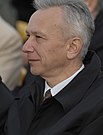2012 Ostric regional election
| |||||||||||||||||||||||||||||||||||||||||||||||||||||||||||||||||
All 15 seats in the Dorada 8 seats needed for a majority | |||||||||||||||||||||||||||||||||||||||||||||||||||||||||||||||||
|---|---|---|---|---|---|---|---|---|---|---|---|---|---|---|---|---|---|---|---|---|---|---|---|---|---|---|---|---|---|---|---|---|---|---|---|---|---|---|---|---|---|---|---|---|---|---|---|---|---|---|---|---|---|---|---|---|---|---|---|---|---|---|---|---|---|
| |||||||||||||||||||||||||||||||||||||||||||||||||||||||||||||||||
| |||||||||||||||||||||||||||||||||||||||||||||||||||||||||||||||||
The 8th Ostric regional election occurred on 3 June 2012. The centre-left Social Democratic Radical Party led by Johann Schöttmer successfully defeated the separatist government of Minister-Chairman Léch Kneller, while also gaining the largest vote and seat gain in the Dorada's history, winning seven seats. Overall, the SRPO returned to its dominant position, forming a minority government with outside support from the National Consolidation Party.
Background
In the 2008 regional election, Léch Kneller's populist Ostric Coalition was able to route the governing SRPO and form a narrow majority with the left-wing Ostric People's Party, connected on the issue of Ostric sovereignty and the creation of a referendum on independence to be held by 2010 at the latest.
Cracks formed early on, with the unionist opposition denouncing a possible referendum as illegal and against the Weranic constitution, and even boycotting sessions of the Dorada between December 2009 and February 2010. By late 2009, Kneller had verbally spat with Chancellor Dietrich Wittmann over the issue on numerous occasions, and the Ostric government began to quickly lose support as Weranic officials pushed back, threatening embargoes if independence was unilaterally declared by Kneller, killing the option of independence by mid-2010 and sending the SRPO to gain support among "soft separatists".
Electoral system
The electorate elects all fifteen members of the Dorada using single non-transferable vote in one island-wide multi-member constituency.
Results
| Party | Votes | % | Seats | +/– | |
|---|---|---|---|---|---|
| Social Democratic Radical Party | 5,306 | 43.52 | 7 | +2 | |
| Ostric Coalition | 2,863 | 23.48 | 4 | –2 | |
| Ostric People's Party | 2,101 | 17.23 | 3 | +1 | |
| National Consolidation Party | 1,256 | 10.30 | 1 | –1 | |
| Ostric Liberal Party | 666 | 5.46 | 0 | 0 | |
| Total | 12,192 | 100 | 15 | 0 | |
| Registered voters/turnout | 16,223 | 75.15 | – | – | |
Reactions
After the results of the election were announced, Johann Schöttmer declared that he would provide "stability and integration" to Ostry under his administration, albeit stressing a regionalist outlook that focused on pushing for better fishing rights for the island. A SRPO minority was quickly formed after the election, supported by a confidence-and-supply agreement with the conservative NKP to secure a majority in the Dorada. After his defeat, Coalition leader Léch Kneller faced calls for his resignation, although he ultimately remained leader of his party into the next election.
Observers noticed that an increased turnout brought the SRPO it's best result in its history, and stated that the party had returned to its position as the "natural governing party of Ostry". Emphasis was also placed on the solid support separatist parties still maintained despite their loss, leading some media outlets to comment that the "Ostric question" was not solved by the unionist landslide, and remained a major factor in Ostric politics.



